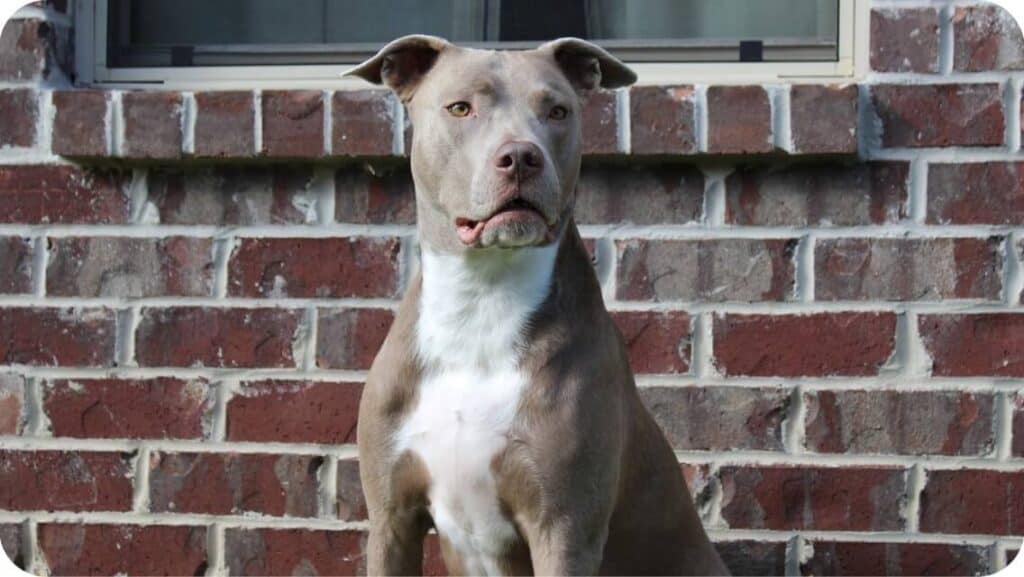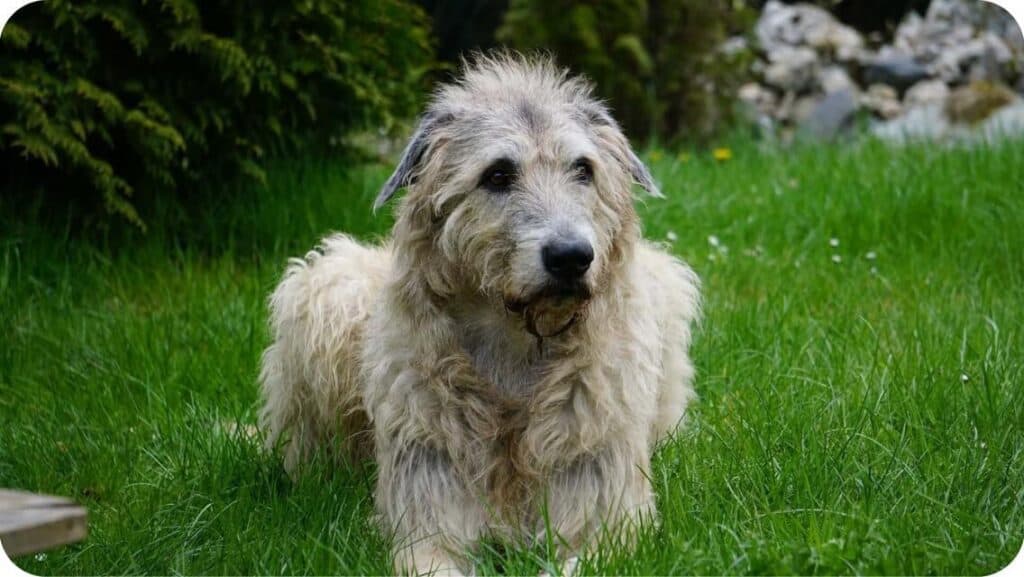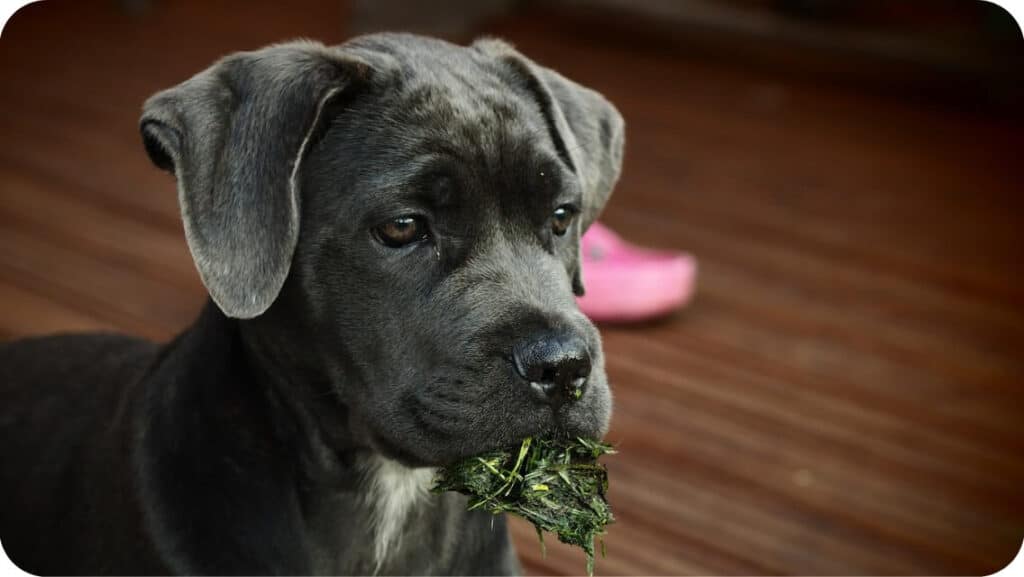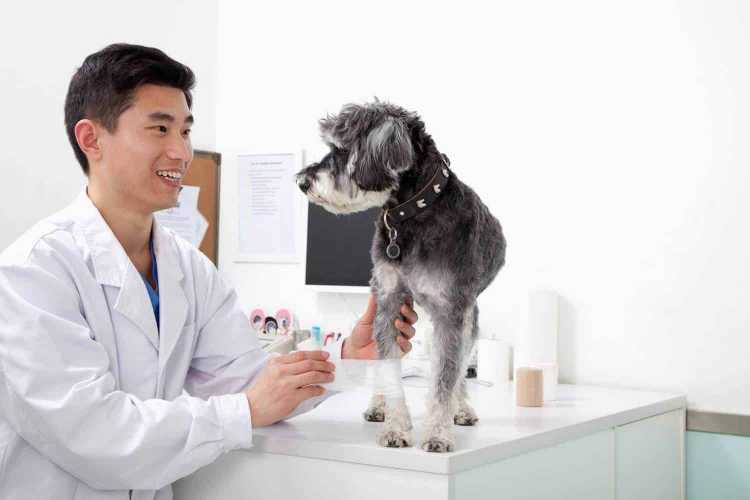Every parent has questions about food allergies, even us puppy parents.
We all know that having a reaction to certain things can be inconvenient and concerning, for both us and our little four-legged friends.
I’ve decided to create this Puppy Food Allergy Guide to shed some light on the subject and answer some of the most common questions about these allergies.

How Are Dog Food Allergies Harmful?
Not only do food allergies affect our dogs, but they also affect us owners as well. If these allergies are left untreated, more serious issues can develop.
For The Owner
While we may not feel what our pup is feeling physically, food allergies can take an emotional and even a financial toll on us.
We feel bad when we see our little guys feeling unwell, and the only option we have to diagnose a food allergy is to see his veterinarian, which is hard on your wallet as well.
For The Dog
If your dog has a food allergy, he may feel sick and miserable at first.
If he goes without medical attention, he can develop secondary skin infections, behavioral changes, his symptoms may worsen, and even just a poor quality of life.

How Do I Know If My Dog Has A Food Allergy?
There are many ways to alert you that maybe he has a food allergy.
It is also helpful to be able to distinguish between a food allergy, an environmental allergy, or maybe a flea allergy.
Before you can treat him, you must first figure out exactly what kind of allergy he is having.
Identify The Timing
If your pup only shows symptoms during certain times of the year, such as a specific season, chances are he is just experiencing seasonal allergies.
If the symptoms are year-round, there is a good chance it may be a food allergy.
Identify The Severity
Food allergies in dogs tend to get worse over time if you continue feeding him the food he is reacting to.
Seasonal allergies can fluctuate throughout the season, but if he is steadily getting worse, you may be looking at a food allergy.
Identify The Process Of Elimination
If you see your vet as soon as symptoms spark up, he may recommend an allergy-friendly diet, eliminating all potentially reactive foods.
It may take a little time, but if he starts to get better, you can almost be certain his symptoms were a result of a food allergy.
Allergy Testing For Specific Food
This is definitely one of the most expensive options, but totally worth it.
It is the fastest and most effective way to figure out exactly what kind of food he is allergic to, and you’ll have an answer in days rather than weeks.
Read: What Are My Dog’s Exercise Needs?
Symptoms Of Dog Food Allergy
Symptoms of food allergies in dogs are very similar to a human’s food allergies.
There are many symptoms that are very common and can almost assure you there is an allergic reaction.
Most Common Signs Of Food Allergies In Dogs
Here is a list of common signs to watch out for when determining whether or not there may be a reaction to your dog’s food.
However, it is important to check with your vet to get a medical diagnosis before assuming it is a food allergy.
Itching, Also Called “Pruritus”
Pruritus is the medical term for a dog’s sensation to itch or the sensation that provokes his desire to scratch, rub, chew, or lick his fur.
Sneezing
Like most allergies, human and nonhuman, sneezing is a pretty common symptom.
However, you shouldn’t diagnose him if he lets out a sneeze, as this can be caused by something as simple as a little dust getting into his nose.
Itchy Paws
As I mentioned above, itching is a sign of an allergy. However, it may or may not be a specific food allergy.
Itchy paws can also be a grass or dirt allergy or something as simple as your dog’s feet just being irritated.
Talk to your vet to determine what kind of allergy he may have.
Hot Spots
A hot spot on your dog is a result of inflammation and irritation.
They may appear to be moist, oozing, and red and they can be very painful and very itchy.
Skin Rashes
A rash is also a common allergy symptom in both dogs and humans.
If you notice a rash on your dog, it is important to consult your vet as an untreated rash can result in a skin infection.

Scaly And/Or Oily Skin
Scaly skin is basically doggie dandruff. If your dog’s skin is itchy or oily, there may be an allergy present.
Some dog breeds are naturally prone to oily skin, but it is always a safe option to check with your vet.
Learn: How Can You Tell If A Dog’s Skin Is Healthy?
Skin Pigmentation
This is called hyperpigmentation. It appears as light brown to black, velvety, rough areas of skin usually in the groin or legs.
The area is typically thickened and hairless.
Leathery Skin Texture
The leathery texture is most commonly due to excessive itching or rubbing.
If your dog has an allergy and begins to continue to roughly itch, the outer layer of the skin thickens as a defense mechanism.
Eye Discharge
Mucus, yellow-green pus, or watery eyes can all be due to inflammation of the lining in your dog’s eye.
While this is a common allergy symptom, there could also be other various reasons for it so it is important to check with the vet before self-diagnosing.

Red Eyes
One of the earliest signs of allergies is red eyes. Some breeds are more prone to eye issues than others.
It is likely just a sign of a slight irritation from itching or just a mild allergy.
But, you can always stay on the safe side and take him to the vet to rule out any other possible conditions.
Hair Loss
Hair loss because of allergies is usually the result of licking or biting the irritated areas.
Normally, if your dog experiences hair loss, they likely are also going to experience the leathery skin texture as well.
Ear Infection
Chronic ear infections are also one of the most common signs of allergies.
The only way to know if your dog has an ear infection is to check with your vet.
But, there are a few signs to look out for such as redness in the ear canal, excessive scratching at the ears, or wax buildup.
If an ear infection is left untreated, it can result in permanent hearing loss or loss of balance and coordination.

Yeast/Bacterial Infection Of Skin Or Ears, Also Called “Pyoderma”
Bacterial infections tend to happen often when the skin has been broken and moisture and bacteria get introduced.
This is likely a result of itching too hard to the point of breaking the skin.
It is important to get your dog checked out because it could also be a sign of other issues such as a suppressed immune system which can make him more vulnerable to other illnesses.
Gastrointestinal Food Allergy
Gastrointestinal symptoms are definitely not fun to deal with. Not only for your dog but for you as well.
Diarrhea (With or Without Blood/Mucus)
As with humans, diarrhea is a common sign that there is something making the intestines uncomfortable.
It is quite often uncontrollable, which means it can definitely make a mess!
If there is blood present, a trip to the vet’s office is very important and immediate!
Straining To Pass Stool
Another uncomfortable bowel issue completely opposite of diarrhea is constipation.
This is when your dog is trying hard to use the restroom but can’t. Not only is it uncomfortable, but also painful for your dog.
Vomiting
Vomiting is usually a common sign of an upset stomach in everyone, four-legged and two-legged.
It is a common sign of allergies, but could also be something as simple as eating too much or suddenly changing a diet.

Abdominal Pain
Pain in your dog’s abdomen is an intense stomach ache. Instead of feeling nauseous, it is more of sharp, stabbing pain.
It is most commonly associated with constipation.
You may read: Doggie diapers for female dogs in heat
Other Types of Dog Food Allergy Testing
There are a couple more ways of testing for allergies than the ones I previously mentioned.
Blood Tests
Blood tests exist, but they are not very accurate because they don’t test for each specific allergen.
Before drawing your dog’s blood for results, it is best to start out with the food elimination diet.
Patch Tests
Patch tests are considered to be a bit more accurate than blood tests but they are not commonly done.
The test consists of taking a protein, such as beef, and mixing it with petroleum jelly. It is then taped to your dog’s skin for about two days.
If redness or irritation occurs, it is positive for an allergy. If not, it is negative.
Dog Food Allergy Treatments
Treating dog food allergies isn’t very difficult.
You’ll need to remove the reactive food entirely but making sure your dog is still getting the right nutrients.
Learn How To: Take Care Of My Puppies Teeth

What Food Ingredients May Cause An Allergy?
An allergy can be caused by a number of foods so it is important to find out exactly what foods you can and can’t give your dog.
Here are the most common foods that cause allergies.
Beef
This is the #1 protein source for dogs, but also the #1 allergen.
The more dogs eat something, the more likely they are to develop an allergy to it.
Dairy
A similar issue that humans and dogs have in common is lactose intolerance.
Although dairy allergies are rare in dogs, they can have the same effects as dairy allergies for humans.
They will likely be just as miserable.
Wheat
A wheat allergy is considered a grain allergy.
Luckily, if your dog develops an allergy, the treatment and recovery process is very straight forward.
Many dog foods advertise that they are grain-free, which helps avoid a reaction to a grain allergy.
Eggs
An egg allergy in your dog is most likely a reaction of your dog’s immune system to the proteins present in the egg yolk.
Although it is rare, this reaction could possibly result in anaphylactic shock.
Chicken
Chicken allergies in dogs are for the same reason as beef allergies.
Although it is full of protein, the more he eats, the higher the chance of developing an allergy.

Lamb
Lamb was once a safe choice in feeding your pup.
Soon after the popularity began to increase, it was then put in the same category as beef and chicken when it came to allergies.
Soy
An allergy to soy is not exactly one of the most common, but it is definitely one of the worst.
Soy allergies can cause major problems to your dogs’ reproductive system as well as their liver.
I would recommend staying away from the soy to completely avoid this allergy.
Fish
As with lamb, fish was considered a safe food but as it becomes more common in dog food, the allergy population has risen.
As it continues to increase in popularity, you can likely see more and more dogs develop a reaction.
How To Treat Food Allergies With The Elimination Diet?
There are four ways your vet will recommend when choosing a diet for your dog.
This is a list of ways your vet will help you choose a protein that will likely pinpoint an allergy unless you opted for a regular allergy test.
If Your Dog Has Never Eaten Those Before
He will want you to find an ingredient your dog has never had before.
That being said, if there is beef, chicken, or any other suspects that are part of your dog’s diet, those can be ruled out in this part of the test.
If These Are Not Too Similar To Earlier Items
He will want to avoid ingredients that are too much alike.
For example, if your dog has an allergy to chicken, he will most likely not recommend giving your pet turkey because they are close in similarity.

What Your Dog Actually Wants To Eat
Obviously, in order to find a dog food right for your dog, he will need to approve of it.
If he doesn’t like the food, he is not going to eat it, which can result in weight loss.
You’ll definitely want to find a food your dog will actually enjoy eating.
What You Actually Want To Feed Your Dog
Some proteins are more expensive than others so you will have to talk with the vet about your budget.
For instance, your vet may try a kangaroo or bison dog food diet.
While allergies to these dog foods are rare, the kangaroo dog food is likely twice as expensive as the bison.
Read: 14 Weird Symptoms Why Puppies Vomit?

How Do I Choose Foods For My Dog With A Food Allergy?
There is really no single dog food that is best for allergies.
The right food will depend on what kind of food allergy your dog has, as well as how much you are able to spend on food.
Know Your Dog’s Allergy
The first step, of course, knowing what your dog is allergic to.
This will be determined by the allergy test or the elimination diet we talked about.
Become A Label Expert
If you find a food that seems okay based on the ingredients on the front of the name of the recipe, which maybe along the lines of “made with real chicken”.
Some allergens are hidden in the complete ingredient list on the back.
Be sure to read thoroughly and watch out for whatever causes your dog’s allergy.
Quality vs. Quantity
High-quality foods tend to be more expensive, but also packed with nutrients.
As a result, you won’t have to feed your dog as much throughout the day.
Cheaper dog foods aren’t as full of nutrition so your dog will probably want to eat more.
In the long run, cheaper food will cause you to actually lose money because you will have to buy more bags, more frequently.

Consult With Your Vet, But Also Do Your Own Research
Your vet will be a great source of information but they aren’t ALWAYS the best to ask for advice for a few reasons.
Usually, they may try to push a prescription that will probably have nothing to do with your dog’s specific allergy.
Another issue is when a vet recommends a certain brand, they usually get some kind of kickback from that particular company.
Instead of asking specifically what to give your dog, it is best to just as what you should look for and what you should avoid.
Get The Best You Can Afford
As I previously mentioned, some foods can be outrageously pricey. It is best to go with food that is reasonable for your budget.
Unless your dog has a severe medical condition the requires the expensive stuff, his lifespan will not be affected by getting the $35 bag of food instead of the $120 name brand food with the same exact ingredients.

How Can I Prevent Dog Food Allergies?
Sadly, it’s difficult to prevent a dog food allergy, especially since genetics can play role in allergies.
However, many dogs become allergic after long-time exposure so if you change your dog’s protein source often, he will be less likely to develop a reaction.
Dog Food Allergy FAQs
Here are a couple more of the most common questions when it comes to your puppy having a food allergy.
:max_bytes(150000):strip_icc():format(webp)/AMRImage-E-GettyImages-171325224-56a26ba55f9b58b7d0ca0aa1.jpg)
# Are Dog Food Allergies Genetic?
A food allergy may or may not be genetic.
Genetics don’t account for every food allergy, but they can definitely be a contributing factor in specific ones.
# How Long Do Food Allergies Last?
As far as how long your dog will be allergic to food, the answer is forever.
It is very rare to outgrow a food allergy. Regarding how long a reaction will last, it may take two to three weeks after eliminating the allergen for total improvement.
# How Common Are Dog Food Allergies?
Only about 10% of dogs develop some sort of allergy and about 10% of those dogs develop food allergies.
Now while 10% of 10% may seem like a small number, remember that there are about 73 million family dogs in the United States, so that means at least 730,000 dogs in the US have food allergies.
# Can I Make Homemade Food If My Dog Has Allergies?
It depends. If your vet helps you first to come up with a balanced diet, then yes.
If you think you can just buy some bison meat and throw it on your dog’s plate, then the answer is probably no. Because homemade dog food requires some research.
It is important to seek help from your vet before changing any diet.
# Should I Try A Special “Dog Food Allergies Raw Diet”?
The raw diet is pretty controversial because some people may swear by it, while others may think it is the worst possible thing you can do for your dog.
Like homemade food, it is important to know what you are doing.
If you want to try a raw diet but don’t feel totally confident, you can try one of the premade raw diets on the market.
# Are There Any Medications For Dog Food Allergies?
While there are medications to help subside allergies, there really isn’t a specific dog food allergy medicine. For example, Benadryl or Zyrtec are pretty safe allergy medications for dogs.
Your vet can help you decide on the best option for your dog.
# Can Dog Food Allergies Cause Ear Infections?
While ear infections aren’t typically a symptom of food allergies, itching is. If he is scratching his ears a lot, he may break the skin and allow bacteria to enter.
Food allergies can also weaken his immune system which in turn, can increase the risk of ear infections.
# Can Dog Food Allergies Cause Hair Loss?
Absolutely.
Constantly scratching at the same spot loosens the fur and it becomes prone to breakage and falling out.
Because of his weakened immune system, his hair will become dull, dry, and brittle, making it harder to keep his nice coat.
# Can Dog Food Allergies Cause Breathing Problems?
When it comes to allergies, no matter what kind, shortness of breath is very common. This, of course, includes food allergies.
The worse the allergy, the higher the risk of breathing complications.
# Can Dog Food Allergies Cause Coughing?
For the same reason as the shortness of breath, your dog can indeed develop a cough.
This, along with wheezing and snoring, are all tell-tale signs of some kind of allergic reaction.
# Can Dog Food Allergies Cause Seizures?
It is possible for your dog to have seizures due to a food allergy, but it is rare. Your dog would have to be severely allergic to certain food.
Only about 1% of dogs experience seizures in their lifetime. If your dog beings seizing, seek medical attention immediately.

What Fact Helps You The Most?
Hopefully, this guide gave you some kind of insight on determining whether your dog may have an allergy or not.
Feel free to leave a comment about what section provided helpful information to you, or tell me about your experiences with dog food allergies.
If you have any questions that I didn’t cover, don’t hesitate to ask.
I would also love to hear any recommendations you have for hypoallergenic dog foods!
Further Readings
Scaly Skin in Dogs
Hyperpigmentation in Dogs
Discharge From a Dog’s Eyes
Related Topics
1. 15 Best Dog Shampoos For Odor Control
2. Best Dog Shampoo For Dandruff
3. Best Waterless Dog Shampoo
4. Best Dog Diapers For Females In Heat
5. How To Deworm Dogs And Puppies: The Ultimate Guide
6. Why Do Cavalier King Charles Spaniels Smell So Bad?

